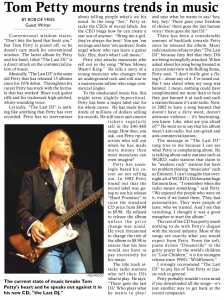Tom Petty mourns trends in music
By Bob De Vries
Chimes - November 1, 2002
Conventional wisdom states, "Don't bite the hand that feeds you." But Tom Petty is pissed off, so he doesn't care much for conventional wisdom. The latest album by Petty and his band, titled "The Last DJ," is a direct attack on the commercialization of music.
Musically, "The Last DJ" is the same old Petty that has released 13 albums since his 1976 debut. Throughout his career Petty has stuck with the formula that has worked: Blues rock guitar riffs and his trademark high-pitched, whiny-sounding voice.
Lyrically, "The Last DJ" is nothing like anything Petty has ever recorded. Petty has no reservations about telling people what's on his mind. In the song "Joe," Petty attacks the CEOs of record labels. Joe the CEO brags how he can create a star out of anyone: "Bring me a girl, they're always the best / You put 'em on stage and have 'em undress / Some angel whore who can learn a guitar lick / Hey, that's what I call music."
Petty also attacks musicians who sell out in the song "When Money Wasn't King." He tells a story of a young musician who changes from an underground rock and roll star to a mainstream sellout who sings commercial jingles.
To the uneducated music fan, this might seem slightly hypocritical. Petty has been a major label star for his whole career. He has made hundreds of millions of dollars selling his records. He still tours and concert tickets regularly sell in the $40-60 range. How then, you ask, can Petty rip on artists who sell out when he has made more money than most musicians can even imagine?
Petty has seemingly based his career on not selling out. In 1982 Petty found out that the record label was going to use his release "Hard Promises" to raise the standard CD price from $8.98 to $9.98. He refused to release the album unless the price change was nixed. He even threatened to change the title of the album to $8.98 to ensure that his fans would not have to pay excessively for his music.
The title track attacks radio stations who tell their DJs what to play. He says: "There goes the last DJ / Who plays what he wants to play / and says what he wants to say / hey, hey hey / There goes your freedom of choice / there goes the last human voice / there goes the last DJ."
There has been a considerable amount of backlash towards Petty since he released the album. Many radio stations refuse to play "The Last DJ" because they feel that their DJs are being wrongfully attacked. When asked about his song being banned in a recent interview with Rolling Stone, Petty said, "I don't really give a flying f--- about any of it. I've turned out. But I was elated when my song was banned. I mean, nothing could have complimented me more than to hear they just banned it at such-and-such a station because it's anti-radio. Now, in 2002 to have a song banned that doesn't have a dirty word, doesn't advocate violence -- it's fascinating, you know. Like, what are you afraid of?" He went on to say that his album wasn't anti-radio, but anti-greed and anti-commercialization.
The message in "The Last DJ" rang true to me because I can see what Petty is complaining about. He is talking about radio stations such as WGRD, radio stations that claim to be "modern rock" stations but have no problem playing "musicians" such as Eminem. I can't imagine that overnight all of WGRD's DJs became huge Eminem fans. "I remember when the radio meant something," said Petty. "We enjoyed the people who were on it, even if we hated them. They had personalities. They were people of taste, who we trusted. And I see that vanishing. I thought it was a good metaphor to start the album."
The rest of the CD has pretty much nothing to do with Petty's disgust with the record industry. Most of the songs are exactly what you would expect from Petty. From the soft, piano driven "Dreamville" to the gritty prayer for the world's children in "Lost Children," it is his strongest release since 1994's "Wildflowers."
I strongly recommend "The Last DJ" to any fan of Tom Petty or classic rock in general.
Petty probably wouldn't even mind if you downloaded all the songs -- it's just another way to get back at the record companies.

